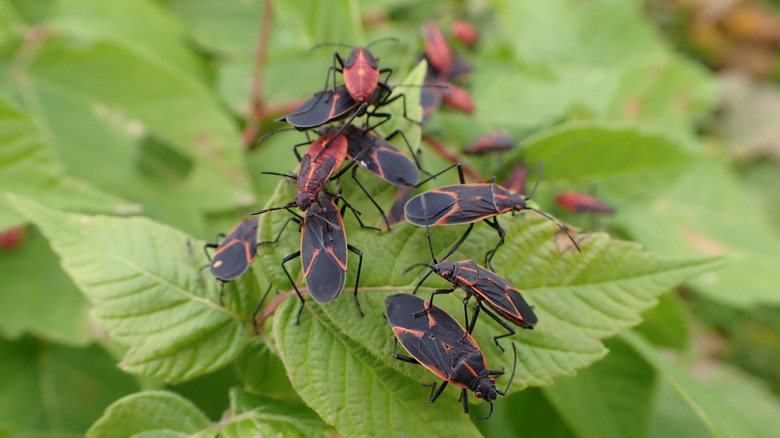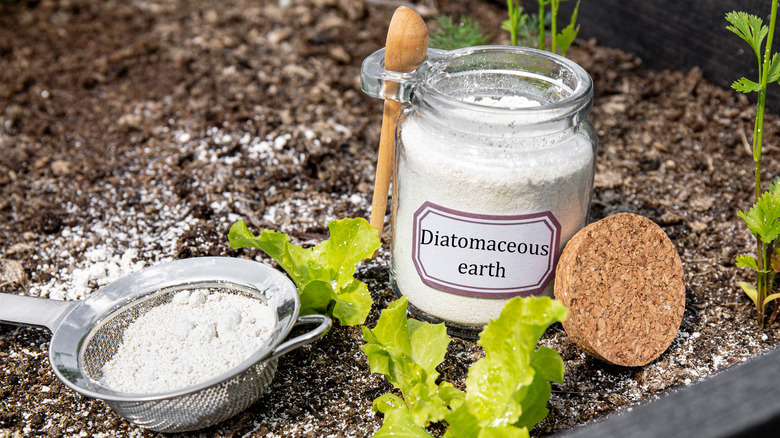The Natural Insecticide That'll Make Boxelder Bugs A Thing Of The Past
We may receive a commission on purchases made from links.
Boxelder bugs (a.k.a. maple bugs or box bugs) generally do not pose significant threats to people and pets and are considered nuisance pests rather than damaging. Yet, when these seemingly harmless insects invade homes, they become unwelcome guests. As temperatures drop, they embark on an undesirable migration indoors, seeking warmth and shelter. The invasion of boxelder bugs into living spaces can escalate swiftly, necessitating effective pest control measures. This is where diatomaceous earth (DE) proves invaluable as a natural and versatile solution.
Belonging to the Rhopalidae or scentless plant bugs family and related to cicadas and stinkbugs, boxelder bugs predominantly feed on boxelder, maple, and ash trees. Characterized by their vibrant red and black hues, boxelder bugs typically go unnoticed as they don't bite, sting, or transmit diseases. While boxelder bugs don't directly threaten humans, their sheer numbers and tendency to cluster make them a nuisance.
Sometimes, the congregation of boxelder bugs on plants, lawns, or garden areas might be a minor annoyance, especially if they release a pungent odor when threatened, disturbed, or squished. However, their impact on plants is typically considered minimal compared to the headaches they can cause when invading homes. So, even while the bugs themselves may not be harmful, finding ways to control or eliminate them is essential. DE offers a safe and non-toxic alternative for those seeking to eradicate these pests without harsh chemicals, ensuring a more sustainable approach to pest management.
Using diatomaceous earth to combat boxelder bugs
Diatomaceous earth, a finely powdered substance derived from fossilized diatoms, is one of the most effective, potent weapons in the battle against boxelder bugs. The science behind its effectiveness lies in its composition of microscopic particles that, upon contact, infiltrate the insects' exoskeletons, leading to their dehydration and eventual demise. You can easily shop for DE products like Luonix, Diatomaceous Earth.com, and Harris online and in home and garden centers.
To employ DE strategically, target areas where boxelder bugs frequent, such as windowsills and door frames. Apply it by creating a thin barrier around potential entry points, ensuring that boxelder bugs must traverse it, exposing them to the desiccating effects. Regular reapplication is vital, especially when you have a severe infestation and after rain or periods of heavy moisture since DE loses efficacy when wet.
When using DE, wear a mask and gloves. This way, you can avoid inhaling and handling the fine particles directly. Although DE is non-toxic, always exercise caution when placing it in areas accessible to pets or children.
Preventive measures to avoid reinfestation
If you're experiencing a minor boxelder bug infestation in your garden or on plants, a simple solution is to gently remove them by hand or use a slow stream of water to dislodge them and drive them away. Additionally, implementing preventive measures can help reduce the chances of reinfestation or minimize the impact of boxelder bugs on your plants and living spaces.
To eliminate or discourage boxelder bugs from invading your home and garden, you will need to employ a comprehensive strategy. Seal cracks and crevices in windows, doors, and foundation walls to block potential entry points. Implement prudent landscaping practices, such as trimming trees and shrubs near your home, to reduce the likelihood of boxelder bugs finding their way inside.
Routine cleanup of fallen seeds and debris from boxelder trees minimizes their attraction to your property. You may also consider planting less appealing trees to boxelder bugs, adding an extra layer of protection. Consider consulting a pest control professional for a thorough inspection and personalized advice on preventing boxelder bug infestations. Combining the DE application with proactive measures can create an inhospitable environment for boxelder bugs in and around your home.


